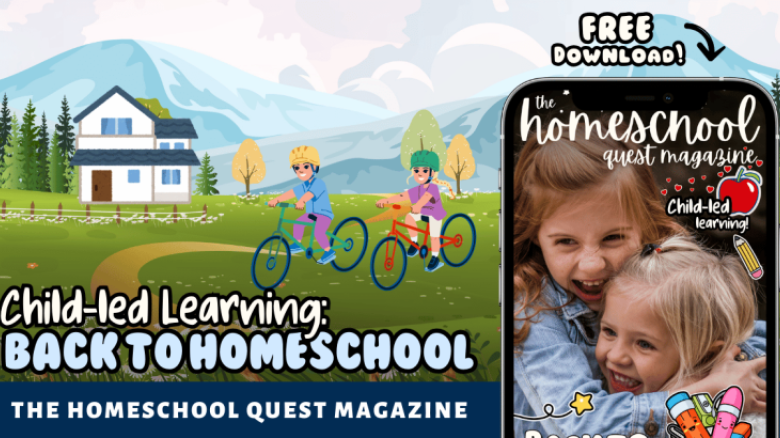By Mary Carroll of His Vessel Academy
Homeschooling offers a unique opportunity to tailor education to your child's interests. By focusing on what excites and engages them, you can create a more enriching and enjoyable learning experience.
Here are some helpful hints to start you toward customizing your curriculum to cater to your child's interests.
4 Things They Want To Learn
Start by having your children list four things they want to learn about this school year. Encourage them to think broadly and include subjects they are genuinely curious about. These could range from animals and space to history and technology.
Questions About Each Topic
Once they have identified their interests, ask them to write three to four questions about each topic.
For example, if one child is interested in marine life, their questions might include: How do dolphins communicate with each other? What is the most dangerous sea creature? How do coral reefs form, and why are they important?
One At A Time
Focus on one topic at a time to avoid overwhelming your child. Dive deep into each subject, exploring it thoroughly before moving on to the next. This approach helps maintain focus and ensures a comprehensive understanding.
Once you are finished, choose a different child's interest. Choosing multiple topics will help keep all your children engaged, and you will be able to simplify your curriculum.
Incorporating Math
Math can be challenging to incorporate into unit studies, but it's not impossible. Use real-world applications and word problems related to your child's interests.
For example, If studying animals, create word problems around the number of babies they produce in a year or over a lifetime.
For instance, how many eggs does a duck lay? about 10 How often does a duck lay eggs? If a duck can lay 300 eggs per year, and each time they lay about 10 eggs, how many times does a duck lay eggs per year? If a duck lives 13 years, how many eggs can they lay in a lifetime?
For older children, use the exponential growth formula to calculate animal population growth. For example, if the population of the African Elephant in 2019 was 150,000 and in 2023, it was 80,000, what is the rate of decrease?
Word Problems
Encourage your child to create word problems related to their interests. This exercise will reinforce their understanding and make math more relevant.
Field Trips
Field trips are another wonderful experience for your children. They can bring learning to life. Visit local sites that align with your child's interests, such as nature reserves, museums, and science centers.
At these sites, you can collect bugs, observe animals, or explore geological formations, which can make learning tangible and more exciting.
Once a field trip is complete, encourage your children to document and present their findings through writing or art.
For example, after a visit to a local park, they could write about the insects they found and research more about each one at the library.
Libraries
Where do you find more ideas for some unit study materials? Libraries are treasure troves of information.
Supplement your science and reading curriculum with books on your child's chosen topic. For instance, if the topic is space, check out books about planets, astronauts, and space missions.
The internet and platforms like YouTube are valuable tools, but ensure the information is accurate. Verify the credibility of sources and watch videos from reputable channels.
Utilizing AI
Another fantastic new technology to help you with homeschooling is AI. Don't shy away from using new technologies like AI. For example, you can use AI tools to generate age-appropriate math word problems, therefore integrating math into your unit study.
I recently asked an AI to create a word problem on birds for a fifth grader, and it produced a suitable and engaging problem. "Jenna loves watching birds in her backyard. One morning, she saw 12 robins, eight blue jays, and five cardinals. She decided to put out a new bird feeder, and the next day, she saw twice as many robins, three more blue jays, and five fewer cardinals." Additionally, it gave me questions and answers.
Don't forget summer fun.
As homeschoolers, we teach even during the summer. We can't help picking up a bug and explaining it to our children.
Take advantage of local resources like children's museums, science centers, colleges, and The Creation Museum.
Plan your visits to new areas around activities your child studied during the year. Many offer summer day camps and special programs where children can dive deeper into their interests under the guidance of experts.
These experiences can inspire new interests and expand their knowledge. If you have multiple children with different interests, have them learn about each other's topics.
This cross-interest learning broadens their horizons and fosters a collaborative learning environment. Children are naturally curious, and fostering this curiosity is key to a lifelong love of learning.
Hands-On Learning
Diversifying your curriculum and making it interactive and hands-on can help them retain knowledge better.
The next time you take your children to the zoo, make them select one animal to study before the event and write a short paper on what they learned.
I know that when I studied our Hippos at the Cincinnati Zoo, I learned not only many facts about their lives but also facts about the engineering feat the zoo created by giving us a clean viewing area.
Social Media & Online Communities
One final resource is social media in online communities and groups for homeschool parents. Platforms like Facebook have groups where you can share ideas, ask questions, and get support from other homeschoolers.
These groups can provide valuable insights and resources to fill any gaps in your curriculum. Homeschool parents are the best resources because they will lead you to Christian activities or events that will not compromise your beliefs.
Customize Your Curriculum
Customizing your curriculum to include their interests can transform their learning experience.
By tapping into their natural curiosity and providing diverse, hands-on educational opportunities, you can help them develop a deeper understanding and love for learning.
Embrace the flexibility of homeschooling, utilize available resources, and watch your child's knowledge and enthusiasm grow.
Read More!
- Log in to post comments


